2020 Presidential Polls and Projections
- Econoline
- Posts: 9607
- Joined: Sun Apr 18, 2010 6:25 pm
- Location: DeKalb, Illinois...out amidst the corn, soybeans, and Republicans
Re: 2020 Presidential Polls and Projections
Exactly. If a state has a population of 12,630,000, and 10,200,000 are eligible to vote, and only 7,800,000 register to vote, and only 5,251,000 actually show up to vote, and 299,681 vote for "3rd party" (neither R nor D) candidates...then if Trump gets 2,476,160 votes and his opponent gets 2,476,159 Trump wins the WHOLE FUCKING STATE, even though less than 20% of the total population actually voted for him and even though 52.9% of the people who voted actually voted against him.


People who are wrong are just as sure they're right as people who are right. The only difference is, they're wrong.
— God @The Tweet of God
— God @The Tweet of God
Re: 2020 Presidential Polls and Projections
That's the idiocy of the electoral college; but we're stuck with it. I still have hope for the national popular vote interstate compact, or at leastapportioning electoral votes based on the popular vote in the state, but there doesn't appear to be enought traction, even though two presients lost the electoral vote recently and still won in the electoral college.
Re: 2020 Presidential Polls and Projections
It’s really not that far from fruition, so I also have hope that this will override the insanity of the antiquated electoral college system.Big RR wrote: ↑Fri Jun 05, 2020 5:19 pmThat's the idiocy of the electoral college; but we're stuck with it. I still have hope for the national popular vote interstate compact, or at leastapportioning electoral votes based on the popular vote in the state, but there doesn't appear to be enought traction, even though two presients lost the electoral vote recently and still won in the electoral college.
https://www.nationalpopularvote.com/written-explanation
For me, it is far better to grasp the Universe as it really is than to persist in delusion, however satisfying and reassuring.
~ Carl Sagan
~ Carl Sagan
- datsunaholic
- Posts: 2737
- Joined: Sun Dec 13, 2015 12:53 am
- Location: The Wet Coast
Re: 2020 Presidential Polls and Projections
The National Popular Vote Interstate Compact will never work unless at least as many Red States as Blue States adopt it. As I said before, most Red States, especially the ones with low populations (and therefore much higher effect than their population should warrant) do not want to give up their power to influence elections their way.
Death is Nature's way of telling you to slow down.
Re: 2020 Presidential Polls and Projections
Did you not read this at the link I provided?datsunaholic wrote: ↑Fri Jun 05, 2020 11:14 pmThe National Popular Vote Interstate Compact will never work unless at least as many Red States as Blue States adopt it. As I said before, most Red States, especially the ones with low populations (and therefore much higher effect than their population should warrant) do not want to give up their power to influence elections their way.
If those nine additional states pass the measure, it’s done - we have 270. The remaining red states won’t have a say about it.The National Popular Vote bill has been enacted by 16 jurisdictions possessing 196 electoral votes, including 4 small states (DE, HI, RI, VT), 8 medium-sized states (CO, CT, MD, MA, NJ, NM, OR, WA), 3 big states (CA, IL, NY), and the District of Columbia. The bill will take effect when enacted by states with 74 more electoral votes. The bill has passed at least one chamber in 9 additional states with 88 more electoral votes (AR, AZ, ME, MI, MN, NC, NV, OK, VA). A total of 3,408 state legislators from all 50 states have endorsed it.
For me, it is far better to grasp the Universe as it really is than to persist in delusion, however satisfying and reassuring.
~ Carl Sagan
~ Carl Sagan
- datsunaholic
- Posts: 2737
- Joined: Sun Dec 13, 2015 12:53 am
- Location: The Wet Coast
Re: 2020 Presidential Polls and Projections
But you need some of those heavily 'Red" 9 States, or some of the others not listed.
AZ last took it up in 2019, with no votes. In 2016 the lower house passed it but it was never brought to a vote in the upper house.
AR last took it up in 2009 and it was never brought to a vote in the upper house.
ME last brought it up in 2018 and it failed BOTH houses. Last time it passed one house was 2008.
MI last took it up in 2018 but it was not voted on. The lower house passed in in 2008 but it was never brought to a vote in the upper house.
MN last took it up in 2019 and it was never brought to a vote in the upper house
NC last took it up in 2019 with no votes. It was passed by the upper house in 2007 but was never brought to a vote in the lower house
NV last took it up in 2019 and it passed both houses but was vetoed by the governor. Their DEMOCRATIC governor. For the same reason I gave, in that he felt it was removing their State's power.
OK last took it up in 2015 with no votes. It was last passed by the upper house 2014 but was never brought to a vote in the lower house
VA last took it up in 2020 and it passed one house and is pending in the other... until after the election.
Just because it passed one house in a State doesn't mean it will again. Every one of those one-house passed bills is dead except VA which will likely die in committee. that means they have to start all over again. And Colorado, which passed both houses and was signed by the Governor, is suspended until a vote of the people this year as a referendum was filed to overturn it.
AZ last took it up in 2019, with no votes. In 2016 the lower house passed it but it was never brought to a vote in the upper house.
AR last took it up in 2009 and it was never brought to a vote in the upper house.
ME last brought it up in 2018 and it failed BOTH houses. Last time it passed one house was 2008.
MI last took it up in 2018 but it was not voted on. The lower house passed in in 2008 but it was never brought to a vote in the upper house.
MN last took it up in 2019 and it was never brought to a vote in the upper house
NC last took it up in 2019 with no votes. It was passed by the upper house in 2007 but was never brought to a vote in the lower house
NV last took it up in 2019 and it passed both houses but was vetoed by the governor. Their DEMOCRATIC governor. For the same reason I gave, in that he felt it was removing their State's power.
OK last took it up in 2015 with no votes. It was last passed by the upper house 2014 but was never brought to a vote in the lower house
VA last took it up in 2020 and it passed one house and is pending in the other... until after the election.
Just because it passed one house in a State doesn't mean it will again. Every one of those one-house passed bills is dead except VA which will likely die in committee. that means they have to start all over again. And Colorado, which passed both houses and was signed by the Governor, is suspended until a vote of the people this year as a referendum was filed to overturn it.
Death is Nature's way of telling you to slow down.
Re: 2020 Presidential Polls and Projections
Oh, I understand that, but enough voters to carry a state? Can't you bomb them or something? Napalm?
“If you trust in yourself, and believe in your dreams, and follow your star. . . you'll still get beaten by people who spent their time working hard and learning things and weren't so lazy.”
- datsunaholic
- Posts: 2737
- Joined: Sun Dec 13, 2015 12:53 am
- Location: The Wet Coast
Re: 2020 Presidential Polls and Projections
That's because a lot of conservatives would vote for the Devil himself, with the antichrist as his running mate, as long as he declared himself a Republican.
Oh wait, they already did.
Democrats haven't used Napalm since LBJ, and that was against Communists.
Death is Nature's way of telling you to slow down.
Re: 2020 Presidential Polls and Projections
Dats I wouldn’t call anything dead at the moment Republicans are about to lose their stranglehold on the Michigan state legislature due to anti gerrymandering measures. A lot of things have potential to change in the next few years. Given the upcoming election will effect how district lines will be drawn all over the country.
Okay... There's all kinds of things wrong with what you just said.
Re: 2020 Presidential Polls and Projections
Another poll showing a tie in Texas. And another poll with Trump hanging on by his fingernails in Iowa.
Biden 368
Trump 132
Ties 38
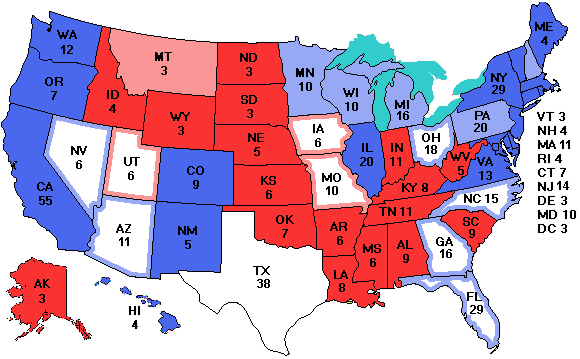
Biden 368
Trump 132
Ties 38

"If I were scooped up by aliens, I would consider it a rescue, rather than an abduction." -- Author Unknown
Re: 2020 Presidential Polls and Projections
FIFY
Another poll showing a tie in Texas. And another poll with Trump hanging on by his fingernails pubic hairs in Iowa.
Your collective inability to acknowledge this obvious truth makes you all look like fools.
yrs,
rubato
Re: 2020 Presidential Polls and Projections
CNN)A few days ago, President Donald Trump tweeted, "SILENT MAJORITY!" amid the recent protests. The President may be hoping that there is a group of people who support him and his positions, yet aren't being captured by the popular zeitgeist.
The polling, of course, suggests that Trump is in a lot of trouble. Most disapprove of his performance on race relations, and he trails former Vice President Joe Biden by high single digits in the polls.
A look at history reveals that the idea of a silent majority is really a misnomer. While majorities may not be out in the street, they aren't silent. They make their viewpoints clear in the polling.
The phrase "silent majority" gained widespread popularity thanks to President Richard Nixon in the late 1960s. Nixon was indicating that those who were protesting the Vietnam War in the streets did not represent the majority of Americans.
Yet the polling at the time indicated that Nixon was heavily supported on Vietnam. When he gave his famous speech on the silent majority in November 1969, his approval rating on the issue was averaging about 60%. Nixon was clearly correct that the majority of people were behind him -- they just weren't "silent" in the polling.
Compare Nixon's situation with Trump's. Trump's approval rating on race relations in a CBS News poll out this week was 33%, or about half of what Nixon's was on the issue that sparked the protests. A nearly identical 32% told the ABC News/Ipsos KnowledgePanel poll they disapprove of Trump's "response to the death of George Floyd in Minneapolis."
Trump has to be hoping that not only are his supporters not showing up to these protests but that they aren't talking to pollsters, either.
During Nixon's time, the polling was about as accurate as I've ever seen it be. You can see this by examining final Gallup polls in the two midterm and two presidential elections during the height of the Vietnam War.
1966 midterms: Final Gallup poll had Democrats winning the national House vote by 5 points. They won it by 3 points.
1968 president: Final Gallup poll had Nixon ahead by 1 point nationally. His national margin ended up being 1 point.
1970 midterms: Final Gallup poll had Democrats up by 6 points in the House. They took it by 9 points.
1972 president: Final Gallup poll put Nixon up 24 points. He crushed Democrat George McGovern by 23 points.
Over those four elections, the average polling error was just 1.5 points. Just as importantly, the polling did not, on average, underestimate the side that had the supposed silent majority.
Indeed, there's nothing that has happened during the Trump era to indicate that the national polling showing him to be unpopular or behind Biden is wrong. The national polling in 2016 had Trump losing the popular vote by 3 to 4 points. He lost it by 2 points. The national generic congressional ballot had Democrats ahead by nearly 9 points heading into the 2018 midterm. They won it by nearly 9 points.
Trump really is this unpopular, and he really is this disliked when it comes to how people believe he is handling race relations. He's no Nixon.
For me, it is far better to grasp the Universe as it really is than to persist in delusion, however satisfying and reassuring.
~ Carl Sagan
~ Carl Sagan
- datsunaholic
- Posts: 2737
- Joined: Sun Dec 13, 2015 12:53 am
- Location: The Wet Coast
Re: 2020 Presidential Polls and Projections
I meant they're dead because the bills have expired. To bring them up again means introducing a new bill, which certainly has a chance if the houses become unlocked from Republicans. But as noted, Nevada's attempt was derailed by their own Democratic governor, and the Democratic majority leader of one of the houses was against the bill in the first place.Crackpot wrote: ↑Sat Jun 06, 2020 11:03 amDats I wouldn’t call anything dead at the moment Republicans are about to lose their stranglehold on the Michigan state legislature due to anti gerrymandering measures. A lot of things have potential to change in the next few years. Given the upcoming election will effect how district lines will be drawn all over the country.
Michigan is expected to lose a House seat in the next reapportionment, which will cause not only a redistricting for the US House seats but also the State house as well so HOPEFULLY the Michigan legislature will be more in tune with the actual political landscape of the State. However, everyone I know in Michigan is a hard core Trumpit, and they will do everything the can to assure Republican minority rule for the forseeable future.
Death is Nature's way of telling you to slow down.
Re: 2020 Presidential Polls and Projections
The process by which the electoral college can be eliminated or circumvented in favour of election by popular vote is a very interesting topic that perhaps deserves its own thread. I started a thread devoted to polling and projections because I didn't want it to get lost in any of the other threads where generic election topics were being discussed, particularly as the election draws nearer and the volume of related content will explode. Thank you.
"If I were scooped up by aliens, I would consider it a rescue, rather than an abduction." -- Author Unknown
Re: 2020 Presidential Polls and Projections
New polls add Iowa to the list of ties, and pretty definitively dash Trump's hope of hanging on to Michigan this time around. Oh, and the poll in TN that has Trump ahead by 9 points? He won the state by 26 points in 2016.
Biden 368
Trump 126
Ties 44
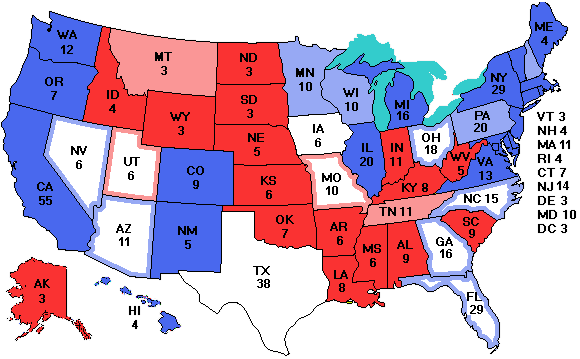
Biden 368
Trump 126
Ties 44

"If I were scooped up by aliens, I would consider it a rescue, rather than an abduction." -- Author Unknown
Re: 2020 Presidential Polls and Projections
For me, it is far better to grasp the Universe as it really is than to persist in delusion, however satisfying and reassuring.
~ Carl Sagan
~ Carl Sagan
Re: 2020 Presidential Polls and Projections
New polls show Georgia flipping back to Trump and Florida staying with Biden.
Biden 352
Trump 142
Ties 44
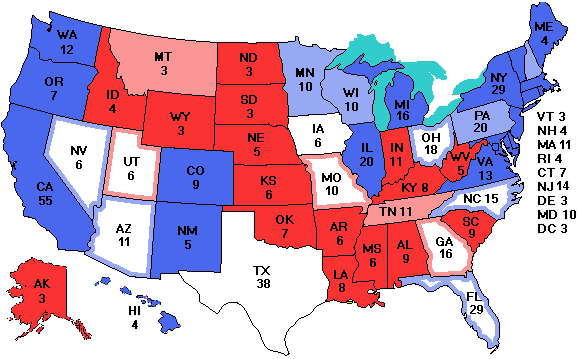
Biden 352
Trump 142
Ties 44

"If I were scooped up by aliens, I would consider it a rescue, rather than an abduction." -- Author Unknown
Re: 2020 Presidential Polls and Projections
A new Iowa poll has Trump ahead by a point (he won by 10 in 2016).
Biden 352
Trump 148
Ties 38
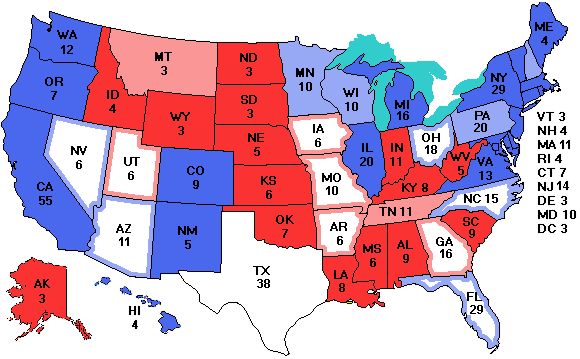
Biden 352
Trump 148
Ties 38

"If I were scooped up by aliens, I would consider it a rescue, rather than an abduction." -- Author Unknown
Re: 2020 Presidential Polls and Projections
It is mind-boggling that Texas remains "tied". Trump will claim it's because of illegals voting and they need to put up a wall between Texas and New Mexico to keep not only the Mexicans out but also the New Mexicans. They are almost as shifty as the old Mexicans.
Re: 2020 Presidential Polls and Projections
A new poll flips Georgia back to Biden. Remember that Clinton lost to here to Trump by only five points, so this state is definitely in play, and media buys are expensive in this market. Trump is going to have to spend huge to defend its EVs.
Biden 368
Trump 132
Ties 38
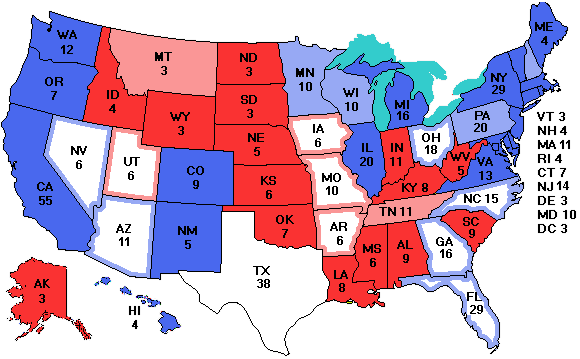
Biden 368
Trump 132
Ties 38

"If I were scooped up by aliens, I would consider it a rescue, rather than an abduction." -- Author Unknown